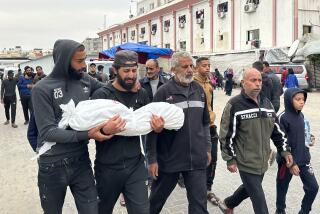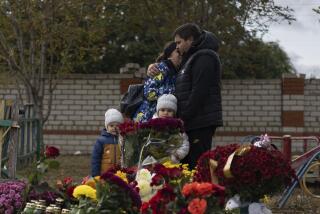Red Cross confirms Afghan civilian toll
- Share via
KABUL, AFGHANISTAN — As the Red Cross confirmed Wednesday that dozens of civilians had been killed in U.S. airstrikes in an isolated district in western Afghanistan, provincial authorities suggested the toll could reach 100. Weeping villagers dug mass graves.
The incident, which appeared to be the most lethal episode in many months involving Afghan civilians accidentally killed by Western forces, cast a pall over Afghan President Hamid Karzai’s first meeting in Washington with President Obama. Karzai, in a statement issued by the presidential palace in Kabul, called the deaths “unacceptable.”
Secretary of State Hillary Rodham Clinton said the United States “deeply regrets” the loss of life, but the American military said it had not yet determined who was responsible.
Although accounts remained sketchy, some new details emerged Wednesday about the fatalities in the district of Bala Baluk in the western province of Farah. The deaths took place during clashes Monday between coalition troops and Taliban fighters, and many insurgents were said to remain in the area.
The U.S. military, which has sometimes infuriated Afghans by appearing slow to respond to reports of civilian casualties, swiftly dispatched a team to the scene. A brigadier general was taking part in the investigation, said Army Col. Gregory Julian, the chief spokesman for U.S. forces in Afghanistan.
Representatives of the International Committee of the Red Cross also traveled to the area, and a spokeswoman in Kabul, Jessica Barry, said Wednesday that there was little doubt that dozens of those killed in two locations were noncombatants. Many of the bodies seen being pulled from the rubble were those of women, children and elderly men, she said.
Provincial authorities said they believed about two dozen insurgents were also killed in the fighting, but a Taliban spokesman, Qari Yousef Ahmadi, insisted that all the dead were civilians. Contacted by telephone, he said Western forces should pay reparations to the families of the dead.
Western military officials say insurgents often try to pass off their own battlefield dead as civilians in order to inflame sentiment against the government and coalition troops, but they have not yet leveled such an accusation in this case.
The American military, while confirming heavy fighting in the area at the time of the deaths, refused to identify the units involved. U.S. Marines are deployed in the area, along with Afghan police and soldiers, and news reports said American special forces were involved in the airstrikes.
Accurate casualty counts are extremely difficult to obtain in such instances, because bodies are usually buried swiftly, in keeping with Muslim tradition. Also, local record-keeping of family sizes and village populations tends to be sketchy. But villagers, aware that their claims might be received with skepticism, brought about two dozen bodies to the city of Farah, the district capital, telling authorities that many more remained at the scene. They also made cellphone videos of rows of corpses, which were being widely circulated Wednesday.
The province’s governor, Rohul Amin, and police chief, Abdul Ghafar Watandar, said the death toll could reach 100. Villagers said many of the dead were from several extended families. Those killed included a medical volunteer for Afghanistan’s Red Crescent, the Red Cross said on its website.
Accounts differed as to whether the villagers voluntarily took shelter in several walled compounds or were forced by Taliban fighters to congregate there. The insurgents have been accused of using civilians as human shields.
Karzai has repeatedly decried civilian deaths and injuries that occur during confrontations between Western forces and insurgents. Coalition commanders have altered some battlefield rules in response, and say they take all possible precautions to avoid harming noncombatants.
Western officials also point out, in frustration, that insurgents often target civilians in suicide bombings and other attacks, and also deliberately place them in harm’s way during fighting.
--
Special correspondent M. Karim Faiez in Kabul and Times staff writer Paul Richter in Washington contributed to this report.
More to Read
Sign up for Essential California
The most important California stories and recommendations in your inbox every morning.
You may occasionally receive promotional content from the Los Angeles Times.










